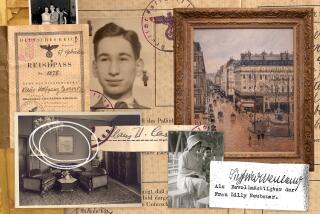BOOK REVIEW : Eccentric Search for Elisabeth Nietzsche : FORGOTTEN FATHERLAND<i> by Ben McIntyre</i> ; Farrar Straus Giroux: $22; 256 pages
Friedrich Nietzsche was not so much a philosopher as a poet who used thoughts for images. With his passion for transcendence, his aversion to the greedy and unattractive forms that material progress assumed in 19th-Century Europe and his dream of a beautiful, pure and winged elect, he sailed close to the edge.
And he went over twice. First, into madness and then, helplessly, into the hands of his stupid and power-hungry sister. Elisabeth, married to a second-rate pamphleteer named Bernhard Forster, shared her husbandâs zealotry for Germanyâs racial and national mission.
While sane and able to speak, Nietzsche had called this kind of thing a low resentment, pertaining not to the superman but to the inferior one. He loathed its vulgar brag, broke with Wagner for glorying in it, insisted that he himself was not German but Polish and called Elisabeth âa vengeful anti-Semitic goose.â
But Elisabeth had possession. First she possessed the beautiful, vacant face staring into space. Nietszcheâs writing became popular only after he lost his mind; the photograph of the fierce profile and staring eyes became a pop icon.
After her brotherâs death, she controlled the literary remains, writing an âinsideâ biography, rewriting and completing an unfinished manuscript or two. She reshaped Nietszcheâs idealistic superman into a strident, world-conquering racist, tailor-made for the Nazis.
Having abducted her unworldly poet, she turned him over to Hitler years later--a relay runner in her â80s handing over a switched torch. Hitler visited Elisabethâs monumental Nietszche Archive half a dozen times. He helped with the bills; she helped with his myth. Rarely has Church so thoroughly sold itself to State.
This not-unfamiliar story is the subject of Ben McIntyreâs âForgotten Fatherland,â a jaunty and rather eccentric book. It is not so much the theme, in fact, as the occasion for what he subtitles âThe Search for Elisabeth Nietszche.â Half is a search of a more or less conventional kind: A breezy tour of the published literature along with some rewarding archival work. The other half is a lively though scatty account of a journey the author made to the interior of Paraguay to look up the descendants of a colony of German farmers that Elisabeth and her husband founded in 1886 âfor the purification and rebirth of the human race.â
The two halfs donât really fit together. Not that it doesnât make sense to join the story of Elisabeth and her baleful manipulation of her brotherâs work with an expedition to visit the remains of a cockeyed theory imposed upon a remote and unpromising part of the world. The trouble is that the two parts are told in such different voices. The zany voyager--a hippie in the jungle, almost--goes on to furnish himself with a seersucker jacket, reading glasses and a library research card.
The late Bruce Chatwin knew how to manage such a straddle seamlessly; he was a scholar in the wilderness and a wild man in the library. McIntyre, a British journalist, lacks the same skill, and his seams gape. Still, his love for Nietszche, his outrage over Elisabeth--âan awful woman in both senses,â he calls her at the start--and his lively account of his trip can be appealing.
He spends a while in Asuncion, and gives a picturesque if over-colored impression of its tropical decrepitude. He tells of the tyrant Francisco Solano Lopez who, with his Irish mistress, tried to set up a Napoleon-style court and ruined his country by making war on Brazil and Argentina. He finds a sardonic parallel with the racial empire that Elisabeth, Bernhard and their 14 Saxon farmers fought to establish.
He travels upriver on a rotting barge captained by an exuberant pilot whose feet, âwhich were almost broader than they were long, with crenelated toenails, inspired immediate confidence.â He rides a horse for two days from the river port of Antequera, comes upon the Germany Pop Discotec and reaches Nueva Germania. It is largely Paraguayan, and the Forstersâ mansion lies in ruins. Outside it, though, are seven or eight families descended from the original colonists. They are poor, pure and inbred.
McIntyreâs trip has a certain blithe staginess to it. He hypes it up by exaggerating its uncertainty. Perhaps, he speculates, he would be held hostage by blue-eyed, blond settlers and forced to procreate. Who knows what he would find? The German Consulate in Asuncion, we reflect, could have told him. Sometimes, he seems mainly to be writing a portrait of himself searching.
Still, what he finds does pretty much settle Elisabethâs racist hash. Of the isolated German-speaking families, the remnant of her New Humanity (she retreated back to Germany a few years after she arrived), he writes:
âThey remained what their ancestors had been, 19th-Century German peasants even poorer now than they had been then.â Just as Nazism needed to confirm its sense of superiority by persecuting the Jews, the only thing that seems to keep these settlers going, apart from their Evangelical Lutheran faith, is their contempt for the Paraguayans who live around them. That is wonderfully apt.
More to Read
Sign up for our Book Club newsletter
Get the latest news, events and more from the Los Angeles Times Book Club, and help us get L.A. reading and talking.
You may occasionally receive promotional content from the Los Angeles Times.







